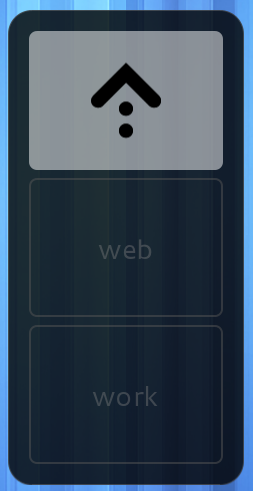This post is a public service announcement for all those using GNOME 3.14 or higher (in my case on Debian GNU/Linux, although that detail probably doesn’t matter here).
I wanted to get rid of the workspace switcher popup. That’s the thing that looks like this and displays briefly whenever you switch workspaces:

I do not know what that thing is for. It serves no purpose that I can see. When I go from one workspace to another, I am interested in the destination. Whether I moved conceptually “up” or “down” from another workspace to get there is utterly irrelevant — the popup is just visual noise on my screen, getting between me and wherever I was going. (And by the way, they’re not “up” and “down” in my mind anyway; they’re “left” and “right”. We’ll never understand each other, GNOME. We’re too different.)
A long time ago I disabled that popup, using Windsor Schmidt’s handy Disable Workspace Switcher Popup extension. I just put it into ~/.local/share/gnome-shell/extensions/disable-workspace-switcher-popup@github.com/, launched gnome-tweak-tool, went to the Extensions tab, enabled the new extension, restarted GNOME, built my own backhoe, and voilà, the workspace switcher popup stopped appearing. Or maybe it was the other order? I don’t know. It seems like an awfully complicated procedure, in retrospect, but anyway it worked.
Then recently, after I upgraded to GNOME 3.14, it stopped working — that is, the workspace switcher popup came back.
Here’s what I had to do to suppress it again:
Add “3.14” to the list of supported shell versions in ~/.local/share/gnome-shell/extensions/disable-workspace-switcher-popup@github.com/metadata.json. In other words, I edited this line, adding the “3.13” and “3.14” on the end:
"shell-version": ["3.0", "3.0.1", "3.0.2", "3.2", "3.6", "3.8", "3.10", "3.12", "3.13", "3.14"],
Then restart GNOME, run gnome-tweak-tool, etc.
Looks like I’m not the only person to have run into this problem. Oskari Saarenmaa opened pull request #6 for this — which I didn’t even see before I created basically the same patch in pull request #7, but my patch supports GNOME 3.13 as well, for whatever that’s worth. (Was GNOME 3.13 ever released? I don’t even know, but if it was, my PR will support it. Yay.)
Why this stuff (along with similar things like disabling window animations when switching workspaces) isn’t tweakable via mouse clicks starting from Settings, I don’t understand. I guess you can launch dconf-editor and gnome-tweak-tool, if you’re the kind of person who knows about such things, but GNOME users shouldn’t have to be the kind of person who knows about such things.
Anyway, here endeth the public service announcement. This is how you can disable the workspace switcher popup in GNOME 3.14. Got that, search engine indexes? Good.

I shudder to confess this to you, of all people, but: a couple years ago I gave up on Linux-on-the-desktop for good, because of just this sort of thing.
I’d used Gnome happily for years, and put up with having to a) tweak it in obscure ways to prevent it from stealing keystrokes from Emacs; b) update the tweaks every time Gnome itself updated. But then (with Ubuntu 13, I think) Gnome changed so much that I simply couldn’t figure out the correct magic (and I suspect something else stopped working — sound, network, suspend, whatever). So I said “the hell with it”, bought a Mac, and haven’t looked back.
Hey, Eric. I can only sympathize — it’s been pretty shocking to me how little effort GNOME puts into preserving users’ customizations across upgrades. I have started looking into converting to Xfce or something else, even though I’d much rather be on the big ship that I know is going to be maintained for a long time. Plus I like the GNOME Foundation’s ideals, not that that really makes up for repeated bad user experience, sigh.
Curious: Why didn’t you just switch to Xfce? I think it’s supposed to be the natural home for people like us. I haven’t switched to it, but it’s the first stop on my itinerary if I ever bail out of GNOMEsville.
Also, Ubuntu stopped using GNOME entirely as I understand it, and went with their own thing called (hilariously) “Unity”. You can Google all about it on DuckDuckGo…
In the meantime, running the Debian ‘testing’ dist treats me pretty well, aside from occasional GNOME lossage, and I’m pretty up-to-date by doing a dist-upgrade more or less every day.